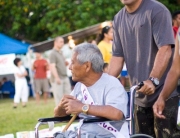The development of the medical technologies in parallel to aging population resulted in an increase in the need for caregiving services; aside from the fact that the population is aging, there is also longevity of life in old age community. The fourth age is becoming more and more common and prevalent (Ykovitz, 2015).
These trends have contributed in one way or another to change the perception of caring for the elderly, Israel is among the leading countries in terms of home care. These days we can see many countries follow this way and helping elderly stay in their homes and grow old in their natural and convenient environment. Thus, in Israel most of the elderly care is taking place in the home of the elderly when only a small percentage of the elderly patient is out of home – whether in a private or a public institution (Brick, 2011).
Moreover, These trends in the various countries in general and in Israel in particular resulted in greater need for caregivers; As noted, the development of medical technologies enable elderly with complex medical and functional status stay and grow old in their homes. However, it requires the family, the patient and the caregiver to adapt and adjust in accordance with the changes and the nature of home care. In the past, if a caregiver was required to provide primarily supportive care, today the caregiver is required to perform in some cases complex nursing care.
Nursing care combined a number of aspects, including in fact many disciplines; Medicine, psychology, physiotherapy, pharmacology, risk management, etc. (The health foundation, 2011). In order for a care to be professional and be in good quality it should include basic knowledge in each of the disciplines described above and in others. Furthermore it should be adjusted and adapted in a proper way for each different patient.
A large percentage of the population is engaged in the issue of care for others- nursing care, environmental care, supportive care, social care. But, only few really know about what is care- How can we recognize when a care is a good care, when a care is a bad care?
And in general it raises the question of – what is professional care? What is quality care?
Numerous studies and researches discuss the issue of care and refer to its diversity, but when we want to review the quality of care, the quality and professionalism of the care we need to consider two factors:
First, what are the outcomes of the care.
Second, what satisfaction is there with the care.
Furthermore, these two factors must coexist with each other, in case the absence of one of the factors listed, it means that the care is neither professional nor quality.
Hence, the subject arise another question; What are the desirable care outcomes? What we aim when we seek care?
Desirable care outcomes refer in most cases to benefit in the patient condition. However, when it comes to situations of terminal or chronic illnesses we can expect for the care to be preventive (Prevent the deterioration of the disease) or maintain skills and physical and mental balance (The health foundation, 2011)
Professional caregiver is a trained and qualified caregiver familiar with the theoretical subjects described above, acquired practical skills, knowledge and with the ability to integrate this with the skills in a way that will lead to a benefit of the patient’s condition. Moreover, the caregiver would know to combine the desired care outcomes with high satisfaction of the patient and his family.
Moreover, as noted and discussed in previous articles, caregiver training is significant; The training is a positive factor in terms of burnout among caregivers (trained caregiver has less chances in experiencing stress). The caregiver training gives meaning and significance for work and thereby effectively reduces the chance of burnout.
Hence, one should not underestimate the importance of vocational training; The training of caregivers should include basic knowledge of the medical and paramedical fields, combined practical tools and skills needed to work in the daily work routine as well as emergency situations. (Neena, Chappell, Reid, 2002).
In conclusion,
After examination of some basic concepts regarding the professional and quality care. Now, we can set ourselves what our professional ambitions and how we as caregiver can progress and evolve in the field of nursing care.
By achieving our professional goal of developing and progressing in the nursing care field we are also contributing to the achievement of a wider goal – Promoting the Caregiving profession.
This our right and obligation to learn, grow and progress in the field of nursing care and thus becoming a professional caregiver will enable us to provide a quality and professional care.




Leave A Comment
You must be logged in to post a comment.